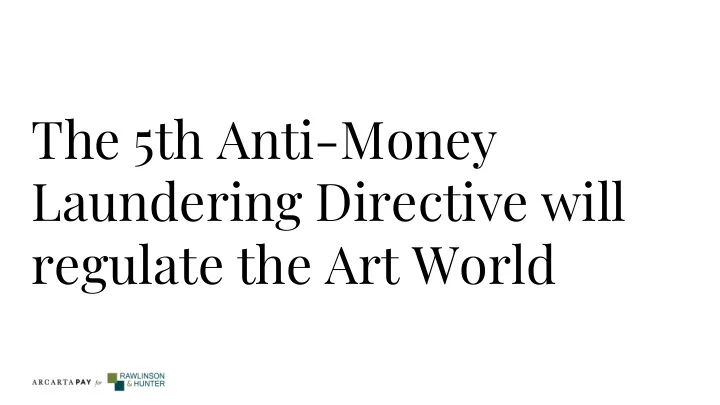

The 5th Anti-Money Laundering Directive will regulate the Art World
It is presently being transposed into national law
Rising fraud and financial crime forces new EU Legislation
As of 2018, global financial crime is estimated to account for 1.4 billion in lost turnover with 47% of businesses a victim of financial crime in the last 12 months Revealing the true cost of financial crime, Thomson Reuters, 2018
Fraud costs the UK economy £193 billion a year - equating to more than £6,000 lost per second every day. UK Fraud Costs Measurement Committee, UKFCMC 2018
As of June 2018 in England and Wales, you are now more likely to be a victim of fraud than any other type of crime. Office for National Statistics, Crime in England and Wales, 2018
The Financial Action Task Force is a group of people that define standards and guidelines to combat money laundering.
The 5th Anti-Money Laundering Directive is the EU Governmental response to these guidelines.
The directive is chiefly concerned with transparency because money laundering requires anonymity and opacity to thrive.
The directive will require: 1. We decide who is responsible for compliance within our business 2. We can quickly respond to HMRC and Law Enforcement
The directive will require: For any transaction over £8,000 - Bank transfer, card, cash, cheque and BitCoin - we’re going to have to carry out Due Diligence on our transaction.
Due Diligence is not the banks responsibility, you are required to carry out your own.
The directive is going ahead, regardless of Brexit
What’s Due Diligence?
A process designed to reduce our risk when transacting with another party.
What transactions present a risk to our businesses?
Any non face-to-face transaction. E.g. Phone, online, email, WhatsApp or Instagram
Politically Exposed Persons E.g. Someone with a prominent public function at risk of bribery or corruption
Clients purchasing from a high risk country E.g. Denmark, Iceland, Slovenia
Clients that can be connected to businesses within industries that are vulnerable to money laundering E.g. Finance, Banking or Real-Estate
Due Diligence means: ‘Doing your homework’
Due Diligence is an information gathering exercise to answer: Who is it I’m dealing with?
Know Your Customer (KYC) means identifying your client.
How do I identify my client?
Auctioneers require valid ID before we bid. We’ll be required to do the same.
Step 1: We identify who is taking ownership of the art object upon completion of the transaction.
If we’re selling to an individual - such as a collector - we’ll have to ask the client provides ID
If we’re selling to a business - such as a Private Limited Company - knowing the name of the business doesn’t constitute identification.
Who within the business will own the Art Object? There may be more than one.
The person(s) taking ownership of the Art Object is called the Beneficial Owner(s).
Beneficial Ownership Register: A list of known identities of company owners
Important when dealing with businesses because: 1. Company structures act as a smokescreen 2. Financial, banking and real-estate industries are vulnerable to money-laundering
Step 2: Does this individual present a risk?
1. Is our Beneficial Owner Politically Exposed? 2. Do they have connections to industries vulnerable to money-laundering? 3. Is the transaction face-to-face or not? 4. Are they from a high risk country?
Step 3: Proof of Due Diligence
We’ll be required to keep an electronic record showing our due diligence to comply.
With GDPR and Data Protection now in effect, any sensitive information will need to be encrypted.
What if we don’t comply?
GOV.UK tells us HMRC could: 1. Charge civil penalties 2. Prosecute 3. Cancel registration 4. Apply for injunctions
HMRC can take legal action in the form of: 1. Management prohibitions and suspensions 2. Restrict a businesses ability to lawfully trade 3. ‘Name and shame’ by publishing details about non-compliant business
Trade without limits support@arcarta.com
Recommend
More recommend